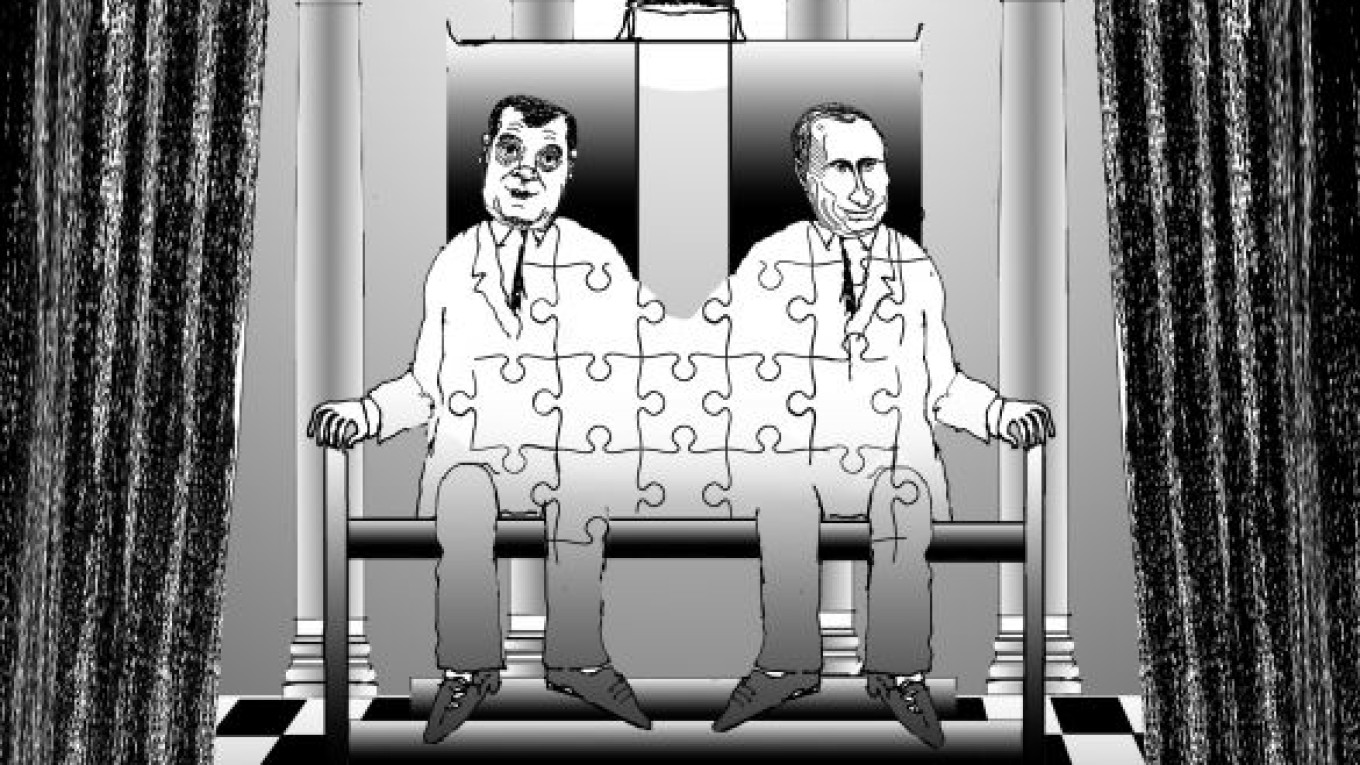Westerners often see Russian politics in terms of a high-level struggle between liberals and conservatives: Alexander Yakovlev versus Yegor Ligachev under former Soviet leader Mikhail Gorbachev; reformers versus nationalists under President Boris Yeltsin; economic liberals versus siloviki under President Vladimir Putin. They also view Russia in terms of a tradition whereby every new tsar partly repudiates the legacy of his predecessor, creating a political thaw at the beginning of a new reign. Former Soviet leader Nikita Khrushchev’s de-Stalinization campaign is Exhibit A.
Both methods were used to describe the relationship between President Dmitry Medvedev and Prime Minister Vladimir Putin — to understand its nature and dynamic and what it portends for Russia. But observers remain puzzled.
To dismiss Medvedev as a mere Putin puppet — a constitutional bridge between Putin’s second and third presidential terms — would be both unfair and wrong. Russia’s third president has a broader role and a distinct function. Conversely, portraying Putin as “a man from the past” and Medvedev as “a hope for the future” exaggerates the differences between them and omits the more important factors that unite them. A better analytical model is needed.
For all the apparent freshness of Medvedev’s recent pronouncements — including his now-famous “Go, Russia!” article that sounded a clarion call for modernization and liberalism — he is borrowing massively from Putin’s vocabulary of 2000. This suggests that the issue of modernization, which lay dormant throughout the fat years of high oil prices, is back on the Kremlin agenda.
In 2008, Medvedev was installed in the Kremlin as part of “Putin’s Plan,” the substantive part of which was known as “Strategy 2020,” a blueprint for continued economic growth and diversification. The intervening crisis only made the Kremlin modify and sharpen its plan. And Medvedev is a key agent in its execution.
Putin chose Medvedev carefully and not only for his unquestionable loyalty, vitally important as that is. Putin, among other things, is a combative nationalist, and he wants Russia to succeed in a world of competing powers. He is certainly conservative, but he is also a self-described modernizer.
As such, he might be compared to Pyotr Stolypin, another conservative prime minister who famously asked for 20 years of peace and quiet — mostly from liberals and revolutionaries — to transform Russia. Stolypin never got the chance — a revolutionary assassinated him in 1911 — and neither did Russia, which stumbled into World War I, leading directly to the collapse of the monarchy and the Bolshevik Revolution.
Putin wants to finish the job, and much works in his favor. He is the tsar. He has both money — the government’s budget and the oligarchs’ fortunes — and the coercive power of the state firmly in his hand. He is the arbiter at the top and the trouble-shooter in social conflicts below. His most precious resource is his personal popularity, which adds a flavor of consent to his authoritarian regime.
But none of that is good enough. The 75 percent of Russians who make up the Putin majority are essentially passive and seek only the preservation of a paternalistic state. Putin can sit comfortably on their support, but he cannot ride forward with it. The best and brightest are not there.
Enter Medvedev. His Internet-surfing, compassionate and generally liberal image helps recruit a key constituency — those beyond the reach of Putin himself — to Putin’s plan. They include the country’s most apolitical citizens and its brainy, techy youth. Whether the plan succeeds is another matter.
Conservative modernization is a gamble. To modernize Russia, one must break the stranglehold of corruption, establish accountability and free the media. At some point, Putin and Medvedev will have to decide: Either they give priority to the survival of the current system and accept Russia’s steady marginalization, or they start opening up the system, putting its survival at risk. Given the weight of geopolitical factors in Russian decision making, it is difficult to foretell which path they will choose.
Putin is no King Lear. He understands leadership and control and does not plan to retire. But Medvedev, today’s front-office guy, is more of a junior partner than a simple salesperson. If he grows in stature and influence, he may eventually inherit the store. One thing is clear, though: He does not like raw meat and the taste of blood.
Thus, Putin’s governing pact with Medvedev, his trademark creation, is likely to remain in force. Both members need each other. So the real issue is not whether the noises that Putin and Medvedev make suggest real divergence and a potential for rivalry, but whether there is daylight at the end of the tandem. Or to put it differently, whether they choose modernization or marginalization.
Dmitry Trenin is director of the Carnegie Moscow Center. © Project Syndicate
A Message from The Moscow Times:
Dear readers,
We are facing unprecedented challenges. Russia's Prosecutor General's Office has designated The Moscow Times as an "undesirable" organization, criminalizing our work and putting our staff at risk of prosecution. This follows our earlier unjust labeling as a "foreign agent."
These actions are direct attempts to silence independent journalism in Russia. The authorities claim our work "discredits the decisions of the Russian leadership." We see things differently: we strive to provide accurate, unbiased reporting on Russia.
We, the journalists of The Moscow Times, refuse to be silenced. But to continue our work, we need your help.
Your support, no matter how small, makes a world of difference. If you can, please support us monthly starting from just $2. It's quick to set up, and every contribution makes a significant impact.
By supporting The Moscow Times, you're defending open, independent journalism in the face of repression. Thank you for standing with us.
Remind me later.


